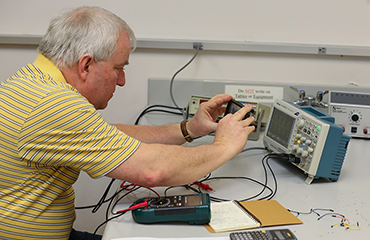
On Friday, March 13, after a week of worsening news about the spread of COVID-19 in the United States and throughout the world, Lander President Richard Cosentino announced that Lander University would begin online instruction Monday, March 16.
Moving the University's traditional face-to-face classes to online learning was a decision that administrators, faculty and staff knew could be monumental for everyone, especially students.
"Any sudden, unexpected change to a course during a semester will present challenges," said Dr. Scott Jones, Lander provost and executive vice president of academic affairs.
With that in mind and as the COVID-19 pandemic became more of a threat to the United States, Lander began preparations to examine all contingencies to keep the Lander community safe and healthy.
Yet, they realized that some classes would be more difficult to transition - science labs, for example, as well as nursing clinical instruction and courses in art, physical education and exercise science. Students could be impacted, too, by many factors upon leaving their classes, including the type of internet service that they would have at home.
"The shift to remote learning may seem challenging at first," Cosentino said in a letter to the Lander community, while assuring students that their professors would help them navigate the transition. "While COVID-19 has brought us a time of uncertainty, one thing remains constant: Lander University is committed to its educational mission and the well-being of its students. We can and will adapt to meet this commitment."
The action was much the same on college campuses around the nation.
Dr. Lloyd Willis, director of the Center for Online and Innovative Learning (COIL), said the initial transition may have seemed daunting to the campus and parents at first. But Lander already had a plan in place for such an occurrence, whether it was caused by a natural or manmade disaster.
"We had policies in place and an online learning handbook to guide us. This was our foundation," he said, noting that about 1,300 of Lander's 3,000 students already were taking at least one online course.
Faculty and staff quickly responded to the university's plan. Within the first 48 hours of the online move, all academic departments were delivering classes and had the technology and training that they needed, said Willis, who teaches English online.
Dr. Holisa Wharton, dean of the William Preston Turner School of Nursing, contacted the S.C. State Board of Nursing early in March to discuss contingency plans, When online delivery of classes was announced, Wharton and her faculty were prepared with the technology to help students have clinical and classroom experiences via online learning. Zoom video conferencing also was put in place for some classes.
The goal was to ensure that students could remain safe and be able to progress with their nursing education. "Having clinicals at nursing homes and hospitals is impractical. We must make sure that students and faculty would be able to protect themselves and their patients, many of whom are a vulnerable population," she said.
However, having the COVID-19 pandemic occur during their education, has provided an opportunity for students to study pandemic nursing. In a recent online class, for example, students learned about arterial blood gases in potential COVID-19 patients.
"We can enhance their clinical experience, albeit with online learning, by studying what is happening now in our world," she said.
Wharton praised Lander's Information Technology Services with the transition to online learning. "They have done a phenomenal job. It is our goal to educate nurses who are capable and competent. We must have them prepared for their future and for the rigors of the NCLEX exam by the National Council of State Boards of Nursing."
But how does a science professor adapt to teaching a lab class online? That was the challenge for Dr. David Slimmer, dean of the College of Science and Mathematics. Not only did his faculty have questions, but Slimmer himself had to move his class, Basic Electronics, to online instruction.
"I had not taught a laboratory course online," he said.
But like his colleagues, he worked to make the switch. With modifications to his class plan, Slimmer quickly adapted. "We are up and running."
A week into teaching online, Lander announced that online instruction would be extended for the spring semester, with all classes, labs and final exams administered virtually. Face-to-face instruction will not resume for Spring 2020 at colleges and universities statewide.
"The greatest educational challenges that many students face are not the shift to online education, but the many societal disruptions of the COVID-19 virus," Jones said. "We are working hard to limit problems caused by the unexpected transition to online education and to help students as they face a variety of other challenges during this crisis," Jones said.
The recent announcement has had minimal impact on faculty, Willis said.
"Rather than just trying to get by for the moment, we now know that we're in it for the long haul, that whatever time we invest in learning new technologies and methods is a good investment of time and resources," he said. "In some ways, it's easier to tell people this is 'the new normal' than it is to say, 'let's see what happens.' "
Jones said that he is "confident that our fantastic students, staff and faculty will overcome our current challenges." A college degree leads to a fulfilling life, Jones said.
"This is even more true during times of economic crisis. Students need to focus on completing their degrees, as it will position them for greater success throughout their lives," he said.